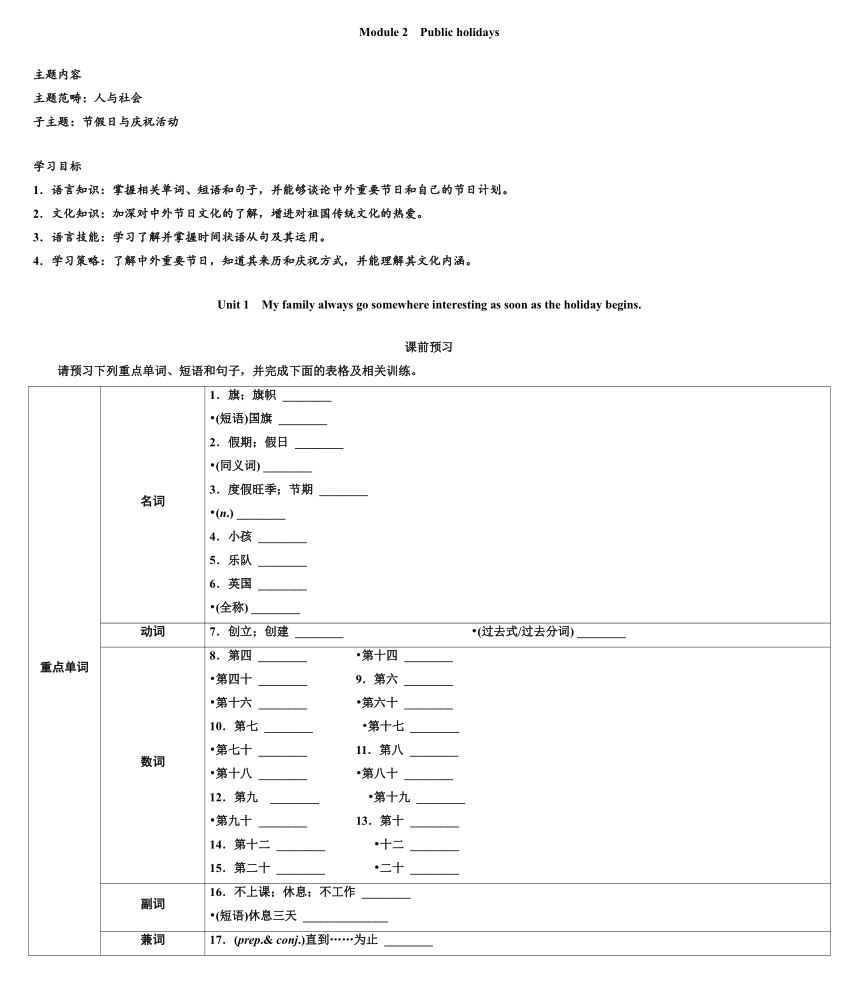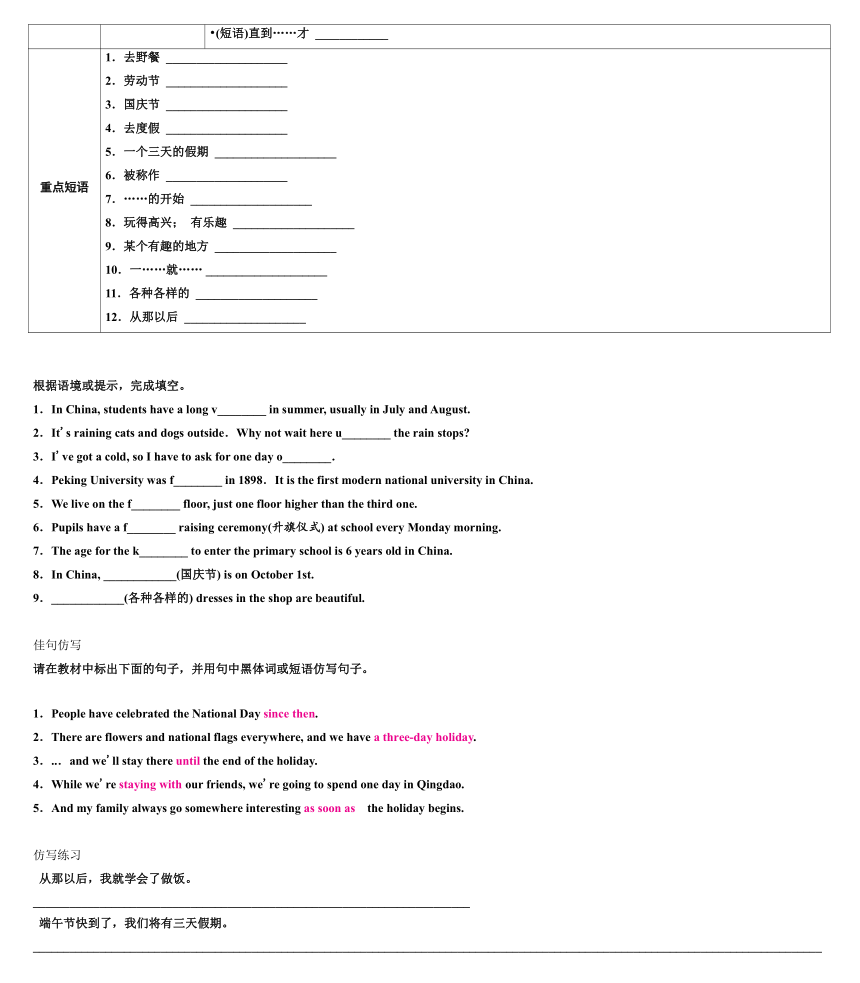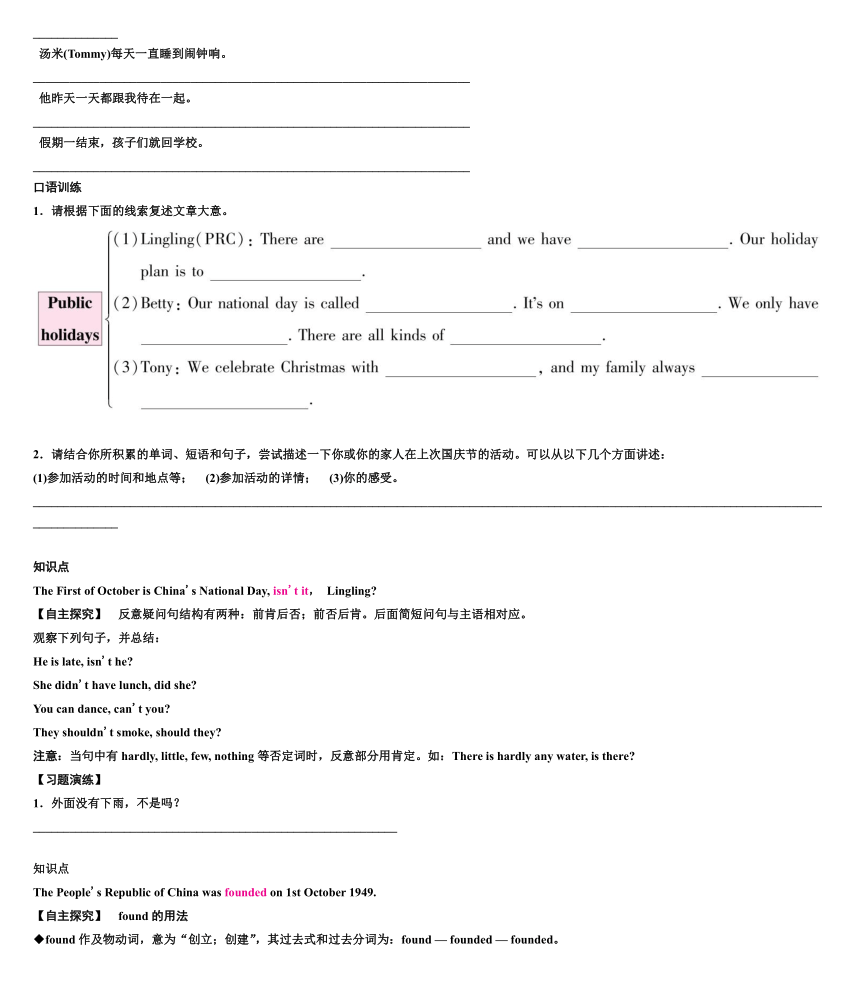Module 2 Unit 1My family always go somewhere interesting as soon as the holiday begins. 导学案
文档属性
| 名称 | Module 2 Unit 1My family always go somewhere interesting as soon as the holiday begins. 导学案 |

|
|
| 格式 | docx | ||
| 文件大小 | 82.1KB | ||
| 资源类型 | 教案 | ||
| 版本资源 | 外研版 | ||
| 科目 | 英语 | ||
| 更新时间 | 2023-08-13 00:00:00 | ||
图片预览



文档简介
Module 2 Public holidays
主题内容
主题范畴:人与社会
子主题:节假日与庆祝活动
学习目标
1.语言知识:掌握相关单词、短语和句子,并能够谈论中外重要节日和自己的节日计划。
2.文化知识:加深对中外节日文化的了解,增进对祖国传统文化的热爱。
3.语言技能:学习了解并掌握时间状语从句及其运用。
4.学习策略:了解中外重要节日,知道其来历和庆祝方式,并能理解其文化内涵。
Unit 1 My family always go somewhere interesting as soon as the holiday begins.
课前预习
请预习下列重点单词、短语和句子,并完成下面的表格及相关训练。
重点单词 名词 1.旗;旗帜 ________ (短语)国旗 ________ 2.假期;假日 ________ (同义词) ________ 3.度假旺季;节期 ________ (n.) ________ 4.小孩 ________ 5.乐队 ________ 6.英国 ________ (全称) ________
动词 7.创立;创建 ________ (过去式/过去分词) ________
数词 8.第四 ________ 第十四 ________ 第四十 ________ 9.第六 ________ 第十六 ________ 第六十 ________ 10.第七 ________ 第十七 ________ 第七十 ________ 11.第八 ________ 第十八 ________ 第八十 ________ 12.第九 ________ 第十九 ________ 第九十 ________ 13.第十 ________ 14.第十二 ________ 十二 ________ 15.第二十 ________ 二十 ________
副词 16.不上课;休息;不工作 ________ (短语)休息三天 ______________
兼词 17.(prep.& conj.)直到……为止 ________ (短语)直到……才 ____________
重点短语 1.去野餐 ____________________ 2.劳动节 ____________________ 3.国庆节 ____________________ 4.去度假 ____________________ 5.一个三天的假期 ____________________ 6.被称作 ____________________ 7.……的开始 ____________________ 8.玩得高兴; 有乐趣 ____________________ 9.某个有趣的地方 ____________________ 10.一……就…… ____________________ 11.各种各样的 ____________________ 12.从那以后 ____________________
根据语境或提示,完成填空。
1.In China, students have a long v________ in summer, usually in July and August.
2.It's raining cats and dogs outside.Why not wait here u________ the rain stops
3.I've got a cold, so I have to ask for one day o________.
4.Peking University was f________ in 1898.It is the first modern national university in China.
5.We live on the f________ floor, just one floor higher than the third one.
6.Pupils have a f________ raising ceremony(升旗仪式) at school every Monday morning.
7.The age for the k________ to enter the primary school is 6 years old in China.
8.In China, ____________(国庆节) is on October 1st.
9.____________(各种各样的) dresses in the shop are beautiful.
佳句仿写
请在教材中标出下面的句子,并用句中黑体词或短语仿写句子。
1.People have celebrated the National Day since then.
2.There are flowers and national flags everywhere, and we have a three-day holiday.
3....and we'll stay there until the end of the holiday.
4.While we're staying with our friends, we're going to spend one day in Qingdao.
5.And my family always go somewhere interesting as soon as the holiday begins.
仿写练习
从那以后,我就学会了做饭。
________________________________________________________________________
端午节快到了,我们将有三天假期。
________________________________________________________________________________________________________________________________________________
汤米(Tommy)每天一直睡到闹钟响。
________________________________________________________________________
他昨天一天都跟我待在一起。
________________________________________________________________________
假期一结束,孩子们就回学校。
________________________________________________________________________
口语训练
1.请根据下面的线索复述文章大意。
2.请结合你所积累的单词、短语和句子,尝试描述一下你或你的家人在上次国庆节的活动。可以从以下几个方面讲述:
(1)参加活动的时间和地点等; (2)参加活动的详情; (3)你的感受。
________________________________________________________________________________________________________________________________________________
知识点
The First of October is China's National Day, isn't it, Lingling
【自主探究】 反意疑问句结构有两种:前肯后否;前否后肯。后面简短问句与主语相对应。
观察下列句子,并总结:
He is late, isn't he
She didn't have lunch, did she
You can dance, can't you
They shouldn't smoke, should they
注意:当句中有hardly, little, few, nothing等否定词时,反意部分用肯定。如:There is hardly any water, is there
【习题演练】
1.外面没有下雨,不是吗?
____________________________________________________________
知识点
The People's Republic of China was founded on 1st October 1949.
【自主探究】 found的用法
◆found作及物动词,意为“创立;创建”,其过去式和过去分词为:found — founded — founded。
◆found是find的过去式和过去分词,意为“找到;发现”。
知识点
辨析found, set up与build
found “创立;创办”;重在强调打基础和建立的结果,建立的只是初步的,仍有待于进一步的发展和完善,常用于被动
set up “建立;安排”;是不及物动词短语,不用于被动语态,暗指有一定的基础,偏重于创立的开始和过程
build “建造;建立”;是三者中最常用的,指一般的建造、建立,并无特指
【习题演练】
( )2.Microsoft ______ by Bill Gates and his partner in 1975.
A.set up B.found
C.was founded D.built
3.我们学校是在1996年建造的,那年他刚出生。
Our school ____________________________ in 1996, and he was born in that year.
知识点
People have celebrated the National Day since then.
【自主探究】 since then意为“从那以后”。
知识点
辨析since与for
◆since意为“自从……以来”。since引导的时间状语从句,主句用现在完成时,从句常用一般过去时。
注意:◆对since引导的时间状语从句提问时,用how long。
◆for后接时间段,相当于“since+时间段+ago”。
【习题演练】
( )4.—How long have you been a teacher
—______ 2006.
A.Since B.For
C.In D.After
知识点
...and we'll stay there until the end of the holiday.
【自主探究】 until的用法
◆until作介词,意为“直到……为止”,后接名词(短语)。
◆until作连词,引导时间状语从句,表示动作或状态一直持续到某一时刻,即“直到……”。
知识点
辨析until与not ...until…
until “一直到……为止……” 主句的谓语动词所表示的动作或状态一直延续到until所表示的时间为止,因此,该动词要用延续性动词
not ...until ... “到……为止,直到……才……” 主句的谓语动词所表示的动作直到until所表示的时间才发生,谓语动词要用非延续性动词
注意:如果主句是一般将来时,until引导的从句用一般现在时。
【习题演练】
5.直到你回来他才离开这儿。
He ________ leave here ________ you come back.
6.我一直等你到天黑。
I waited for you ________________.
知识点
Kids have great fun.
【自主探究】 have fun意为“玩得高兴”,fun前可用great等修饰,表程度。have fun (in) doing sth.表示“做某事很开心”。
知识点
have fun=have a good time=enjoy oneself
【习题演练】
7.昨天孩子们打篮球很开心。
Kids ________________ basketball yesterday.
知识点
We also watch bands play music in public parks.
【自主探究】 watch的用法
◆watch sb.do sth.“观看某人做某事”,强调动作的全过程或发生的经常性。
◆watch sb.doing sth.“观看某人正在做某事”,表示动作正在进行中。
知识点
hear, see, notice的用法跟其一样。
【习题演练】
( )8.At 5:30 pm yesterday, I was watching many boys ______ football on the playground.
A.play B.playing
C.played D.to play
9.我看到你进了学校。
I watched you ________ the school.
强化训练
一、单项填空。
( )1.I have read this ______ book three times.
A.300 page B.300 pages
C.300-pages D.300-page
( )2.Ding Li always watches kids ______ in the park.
A.play B.to play
C.playing D.plays
( )3.The young man ______ his own company in 2017 and it developed fast.
A.founded B.was founded
C.is founding D.was founding
( )4.They have been friends ______ they first met.
A.since B.while
C.before D.after
( )5.—How long will you be away
—I'll have two days ______.
A.away B.off
C.on D.left
二、完成句子。
1.明天我可以请一天假吗?
May I ____________________ tomorrow
2.昨天派对上我们玩得很高兴。
We ____________________ at the party yesterday.
3.你们为什么不去某个有趣的地方呢?
Why don't you go ____________________?
4.很多人选择在春天度假。
Many people choose to ____________________ in spring.
5.他们通常在电视上看足球赛。
They often ____________________ on TV.
主题内容
主题范畴:人与社会
子主题:节假日与庆祝活动
学习目标
1.语言知识:掌握相关单词、短语和句子,并能够谈论中外重要节日和自己的节日计划。
2.文化知识:加深对中外节日文化的了解,增进对祖国传统文化的热爱。
3.语言技能:学习了解并掌握时间状语从句及其运用。
4.学习策略:了解中外重要节日,知道其来历和庆祝方式,并能理解其文化内涵。
Unit 1 My family always go somewhere interesting as soon as the holiday begins.
课前预习
请预习下列重点单词、短语和句子,并完成下面的表格及相关训练。
重点单词 名词 1.旗;旗帜 ________ (短语)国旗 ________ 2.假期;假日 ________ (同义词) ________ 3.度假旺季;节期 ________ (n.) ________ 4.小孩 ________ 5.乐队 ________ 6.英国 ________ (全称) ________
动词 7.创立;创建 ________ (过去式/过去分词) ________
数词 8.第四 ________ 第十四 ________ 第四十 ________ 9.第六 ________ 第十六 ________ 第六十 ________ 10.第七 ________ 第十七 ________ 第七十 ________ 11.第八 ________ 第十八 ________ 第八十 ________ 12.第九 ________ 第十九 ________ 第九十 ________ 13.第十 ________ 14.第十二 ________ 十二 ________ 15.第二十 ________ 二十 ________
副词 16.不上课;休息;不工作 ________ (短语)休息三天 ______________
兼词 17.(prep.& conj.)直到……为止 ________ (短语)直到……才 ____________
重点短语 1.去野餐 ____________________ 2.劳动节 ____________________ 3.国庆节 ____________________ 4.去度假 ____________________ 5.一个三天的假期 ____________________ 6.被称作 ____________________ 7.……的开始 ____________________ 8.玩得高兴; 有乐趣 ____________________ 9.某个有趣的地方 ____________________ 10.一……就…… ____________________ 11.各种各样的 ____________________ 12.从那以后 ____________________
根据语境或提示,完成填空。
1.In China, students have a long v________ in summer, usually in July and August.
2.It's raining cats and dogs outside.Why not wait here u________ the rain stops
3.I've got a cold, so I have to ask for one day o________.
4.Peking University was f________ in 1898.It is the first modern national university in China.
5.We live on the f________ floor, just one floor higher than the third one.
6.Pupils have a f________ raising ceremony(升旗仪式) at school every Monday morning.
7.The age for the k________ to enter the primary school is 6 years old in China.
8.In China, ____________(国庆节) is on October 1st.
9.____________(各种各样的) dresses in the shop are beautiful.
佳句仿写
请在教材中标出下面的句子,并用句中黑体词或短语仿写句子。
1.People have celebrated the National Day since then.
2.There are flowers and national flags everywhere, and we have a three-day holiday.
3....and we'll stay there until the end of the holiday.
4.While we're staying with our friends, we're going to spend one day in Qingdao.
5.And my family always go somewhere interesting as soon as the holiday begins.
仿写练习
从那以后,我就学会了做饭。
________________________________________________________________________
端午节快到了,我们将有三天假期。
________________________________________________________________________________________________________________________________________________
汤米(Tommy)每天一直睡到闹钟响。
________________________________________________________________________
他昨天一天都跟我待在一起。
________________________________________________________________________
假期一结束,孩子们就回学校。
________________________________________________________________________
口语训练
1.请根据下面的线索复述文章大意。
2.请结合你所积累的单词、短语和句子,尝试描述一下你或你的家人在上次国庆节的活动。可以从以下几个方面讲述:
(1)参加活动的时间和地点等; (2)参加活动的详情; (3)你的感受。
________________________________________________________________________________________________________________________________________________
知识点
The First of October is China's National Day, isn't it, Lingling
【自主探究】 反意疑问句结构有两种:前肯后否;前否后肯。后面简短问句与主语相对应。
观察下列句子,并总结:
He is late, isn't he
She didn't have lunch, did she
You can dance, can't you
They shouldn't smoke, should they
注意:当句中有hardly, little, few, nothing等否定词时,反意部分用肯定。如:There is hardly any water, is there
【习题演练】
1.外面没有下雨,不是吗?
____________________________________________________________
知识点
The People's Republic of China was founded on 1st October 1949.
【自主探究】 found的用法
◆found作及物动词,意为“创立;创建”,其过去式和过去分词为:found — founded — founded。
◆found是find的过去式和过去分词,意为“找到;发现”。
知识点
辨析found, set up与build
found “创立;创办”;重在强调打基础和建立的结果,建立的只是初步的,仍有待于进一步的发展和完善,常用于被动
set up “建立;安排”;是不及物动词短语,不用于被动语态,暗指有一定的基础,偏重于创立的开始和过程
build “建造;建立”;是三者中最常用的,指一般的建造、建立,并无特指
【习题演练】
( )2.Microsoft ______ by Bill Gates and his partner in 1975.
A.set up B.found
C.was founded D.built
3.我们学校是在1996年建造的,那年他刚出生。
Our school ____________________________ in 1996, and he was born in that year.
知识点
People have celebrated the National Day since then.
【自主探究】 since then意为“从那以后”。
知识点
辨析since与for
◆since意为“自从……以来”。since引导的时间状语从句,主句用现在完成时,从句常用一般过去时。
注意:◆对since引导的时间状语从句提问时,用how long。
◆for后接时间段,相当于“since+时间段+ago”。
【习题演练】
( )4.—How long have you been a teacher
—______ 2006.
A.Since B.For
C.In D.After
知识点
...and we'll stay there until the end of the holiday.
【自主探究】 until的用法
◆until作介词,意为“直到……为止”,后接名词(短语)。
◆until作连词,引导时间状语从句,表示动作或状态一直持续到某一时刻,即“直到……”。
知识点
辨析until与not ...until…
until “一直到……为止……” 主句的谓语动词所表示的动作或状态一直延续到until所表示的时间为止,因此,该动词要用延续性动词
not ...until ... “到……为止,直到……才……” 主句的谓语动词所表示的动作直到until所表示的时间才发生,谓语动词要用非延续性动词
注意:如果主句是一般将来时,until引导的从句用一般现在时。
【习题演练】
5.直到你回来他才离开这儿。
He ________ leave here ________ you come back.
6.我一直等你到天黑。
I waited for you ________________.
知识点
Kids have great fun.
【自主探究】 have fun意为“玩得高兴”,fun前可用great等修饰,表程度。have fun (in) doing sth.表示“做某事很开心”。
知识点
have fun=have a good time=enjoy oneself
【习题演练】
7.昨天孩子们打篮球很开心。
Kids ________________ basketball yesterday.
知识点
We also watch bands play music in public parks.
【自主探究】 watch的用法
◆watch sb.do sth.“观看某人做某事”,强调动作的全过程或发生的经常性。
◆watch sb.doing sth.“观看某人正在做某事”,表示动作正在进行中。
知识点
hear, see, notice的用法跟其一样。
【习题演练】
( )8.At 5:30 pm yesterday, I was watching many boys ______ football on the playground.
A.play B.playing
C.played D.to play
9.我看到你进了学校。
I watched you ________ the school.
强化训练
一、单项填空。
( )1.I have read this ______ book three times.
A.300 page B.300 pages
C.300-pages D.300-page
( )2.Ding Li always watches kids ______ in the park.
A.play B.to play
C.playing D.plays
( )3.The young man ______ his own company in 2017 and it developed fast.
A.founded B.was founded
C.is founding D.was founding
( )4.They have been friends ______ they first met.
A.since B.while
C.before D.after
( )5.—How long will you be away
—I'll have two days ______.
A.away B.off
C.on D.left
二、完成句子。
1.明天我可以请一天假吗?
May I ____________________ tomorrow
2.昨天派对上我们玩得很高兴。
We ____________________ at the party yesterday.
3.你们为什么不去某个有趣的地方呢?
Why don't you go ____________________?
4.很多人选择在春天度假。
Many people choose to ____________________ in spring.
5.他们通常在电视上看足球赛。
They often ____________________ on TV.
同课章节目录
- Module 1 Wonders of the world
- Unit 1 It's more than 2,000 years old.
- Unit 2 The Grand Canyon was not just big.
- Unit 3 Language in use
- Module 2 Public holidays
- Unit 1 My family always go somewhere interesting a
- Unit 2 We have celebrated the festival since the f
- Unit 3 Language in use
- Module 3 Heroes
- Unit 1 She trained hard,so she became a great play
- Unit 2There were few doctors, so he had to work ve
- Unit 3 Language in use
- Module 4 Home alone
- Unit 1 I can look after myself, although it won’t
- Unit 2 I became so bored with their orders that I
- Unit 3 Language in use
- Module 5 Museums
- Unit 1 Don't cross that rope!
- Unit 2 If you ever go to London, make sure you vis
- Unit 3 Language in use
- Module 6 Problems
- Unit 1 If I start after dinner, I'll finish it be
- Unit 2 If you tell him the truth now, you will sho
- Unit 3 Language in use
- Revision Module A
- Module 7 Great books
- Unit 1 We're still influenced by Confucius's idea
- Unit 2 It is still read and loved.
- Unit 3 Language in use
- Module 8 Sports life
- Unit 1 Daming wasn't chosen for the team last time
- Unit 2 He was invited to competitions around the w
- Unit 3 Language in use
- Module 9 Great inventions
- Unit 1 Will computers be used more than books in t
- Unit 2 Will books be replaced by the Internet?
- Unit 3 Language in use
- Module 10 Australia
- Unit 1 I have some photos that I took in Australia
- Unit 2 The game that they like most is Australian
- Unit 3 Language in use
- Module 11 Photos
- Unit 1 He's the boy who won the photo competition
- Unit 2 The photo which we liked best was taken by
- Unit 3 Language in use
- Module 12 Save our world
- Unit 1 If everyone starts to do something, the wor
- Unit 2 Repeat these three words daily: reduce, reu
- Unit 3 Language in use
- Revision Module B
